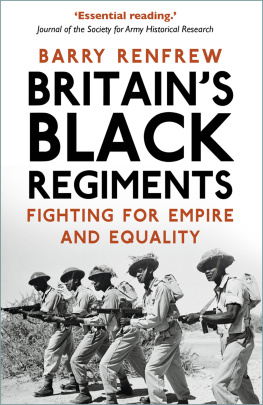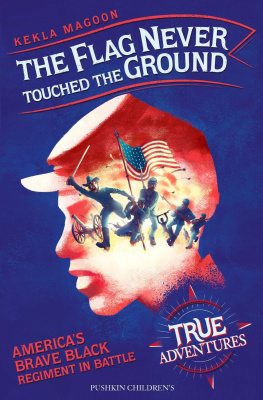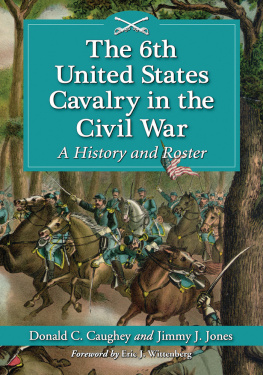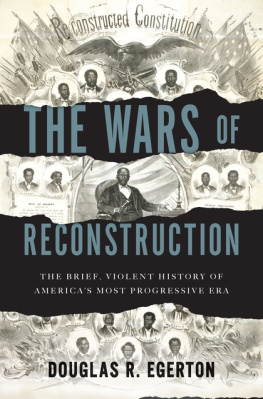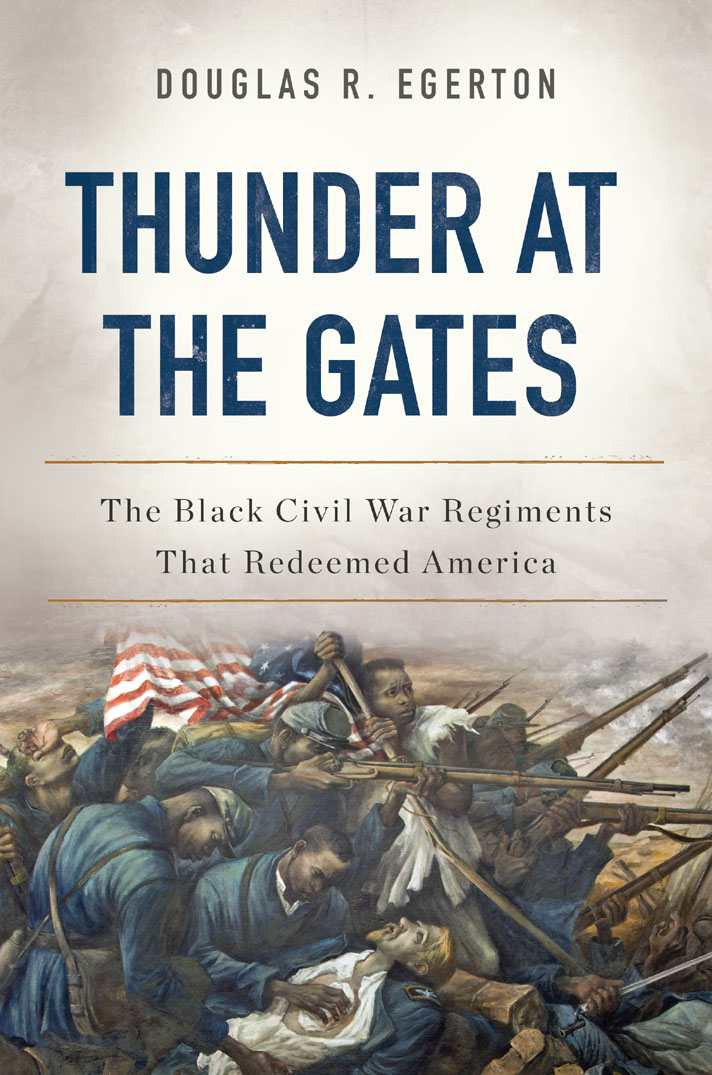Table of Contents
Guide

WRITING A BOOK IS OFTEN A TOUGH GRIND, BUT SOME ASPECTS OF the process never get old, and my favorite part of wrapping one up is getting to express my gratitude to friends and colleagues who helped along the way. I am absurdly lucky to count so many kind, supportive, and wonderful people as my pals.
Andrew Cohen read Chapter 1 and helped me sort out Peter Vogelsangs confusing marriages and genealogy; his Contraband, as good fortune would have it, came out at just the right moment. Other exceptional scholarsPatrick Rael, Leslie Gordon, and Matt Masonread some of the early sections and saved me from several errors, as did Thomas J. Brown, whose knowledge of the Fifty-fourth is encyclopedic. Toms co-edited volume Hope and Glory appears often enough in my notes to indicate what an immense help it was in crafting this book. Two more longtime pals, John Quist and John Belohlavek, put aside their own projects long enough to comment on portions of the manuscript; the tradition of Friday martinis with John B. at SHEAR conferences is now nearly three decades old and remains for me a highlight of the meeting.
Three very clever friends read Chapter 6 and provided me with detailed comments and suggestions. If in the end I did not accept Gary Kornbliths suggestion that I rename that section Hospital Sketches in a nod to Louisa May Alcott, I did incorporate all of his other shrewd recommendations. (It is always wise, of course, to listen to a man who wears a Frederick Douglass tie, as Gary does on occasion.) Carol Faulkner also gave the chapter a good, close reading and brought several books to my attention that had escaped notice, as did Stacey Robertson, who bluntly told me what parts of the chapter didnt work. Only a dear pal will do that.
During the spring semester of 2015, I was invited to be the Merrill Family Visiting Professor at Cornell University, which gave me the opportunity to try out portions of this material on a group of marvelous students and the time to write it up into some of these chapters. I am deeply grateful to Ed Baptist, Barry Strauss, and especially the wonderful Amy Kohout for making those months a terrific experience.
Two dear friends of many years, Alan Gallay and Don Wright, read every page of the manuscript, as they have for other projects in earlier years. Come to that, Alan has been reading my pages now for thirty-six years, since our long-ago days in graduate school, and its hard to imagine finishing a book without their insightful comments, tough criticism, and Dons hilarious doodles in the margins. But both know, I hope, that thats not why I so value their friendship. Their only flaws are that they both now live so far away. My pal Graham Hodges, at least, remains nearby at Colgate University, and Clarence Taylor and Carol Berkinto whom I owe so muchare not too terribly far off in Manhattan.
At Basic Books, Dan Gerstle has been an absolutely superb and attentive editor, and this is a much better volume for his multiple readings and thoughtful editorial pen. Cindy Buck and Sandra Beris helped to transform the manuscript into a book. Thanks especially to my extraordinary agent, Dan Green, who supported this project from the first and who reads every page I send him and responds with wise and discerning comments. I am also grateful to Peter Ginna for his advice and support. And as luck would have it, I have generous cousinsMartha Ware and Steve Cole, and Frank Schroth and Annie Daviswho opened up their homes (and wine cellars) to me in Washington and Boston long enough for me to conduct much of the research in this book. Plus, they are just lovely people to talk books and music and politics with. Jeanann Wieners helped me with some of the images without laughing at my Luddite sensibilities (well, actually she did). At Le Moyne College, I am again indebted to research librarian Wayne Stevens, who can track down the most obscure monograph or document, and to the colleges Committee on Research and Development for its generous funding for the images and maps reproduced here.
Thunder at the Gates would not be the book it is without Leigh Foughts advice, support, and editorial suggestions, and not merely because she is one of the nations leading experts on Frederick Douglass and his family. She tells me when pages work, makes perceptive recommendations on how to fix paragraphs that need help, and was genuinely heartbroken by the murder of James Henry Gooding at the hands of Andersonville guards. Most of all, Leigh listened patiently to my endless stories about the men and women who fill these pages and just generally puts up with me, which is no small feat, and so to her I dedicate this book. Final thanks, of course, go to my brilliant, gorgeous, and industrious daughters, Kearney and Hannah, who are perfect in every way. To quote the great philosopher Pete Townshend, they make me laugh and sing, now that Im old and gray.
Also by Douglas R. Egerton
The Wars of Reconstruction: The Brief, Violent History of Americas Most Progressive Era
Year of Meteors: Stephen Douglas, Abraham Lincoln, and the Election That Brought on the Civil War
Death or Liberty: African Americans and Revolutionary America
Rebels, Reformers, and Revolutionaries: Collected Essays and Second Thoughts
He Shall Go Out Free: The Lives of Denmark Vesey
Gabriels Rebellion: The Virginia Slave Conspiracies of 1800 and 1802
Charles Fenton Mercer and the Trial of National Conservatism
The Denmark Vesey Affair: A Documentary History (with Robert L. Paquette)
The Atlantic World: A History, 14001888 (with Alison Games, Kris Lane, and Donald R. Wright)

CREDIT: CHARLES WAINWRIGHT
Douglas R. Egerton is a professor of history at Le Moyne College. The award-winning author of seven previous books, he lives with his wife, historian Leigh Fought, in Fayetteville, New York.

T HE YOUNG HARVARD STUDENT HAD ONCE DREAMED OF LIVING in times called calamitous, and now he understood that this was no moment for those who harbored any doubts about their cause, or about their courage. Aboard the steamers Williams, Maple Leaf, and Recruit, on the morning of August 3, 1863, the soldiers of the Fifty-fifth Massachusetts Volunteer Infantry Regiment prepared to debark on Morris Island, just south of Charleston Harbor. The skies shone clear and beautiful, but the regiment had recently learned of the disastrous assault on Battery Wagner and the heavy losses incurred by their sister unit, the Fifty-fourth Infantry. The news was particularly heartrending for the Fifty-fifths commander, Colonel Norwood Penrose Hallowell, as his older brother, Edward Needles Hallowell, had been badly wounded in the fight. If we succeed in taking Charleston, vowed Lieutenant George Garrison, the intention is, I think, not to leave one stone upon another, but to level it to the ground. Also watching Morris Island and the U.S. blockading fleet heave into view were two former slaves turned schoolteachers, Nicholas Said and James Monroe Trotter. Two other soldiers were still in transit from Boston. One of them, Henry Jarvis, born a slave on Virginias Eastern Shore, had stolen a small craft in 1861 and sailed thirty-five miles across the Chesapeake Bay to Fort Monroe and freedom. The other, John M. Smith, a peddler and stove-maker from Maine, had deserted the Fifty-fifth from Camp Readville in Massachusetts. Captured in Boston, Smith was given the choice of trial and possible execution or rejoining his unit in the South. Rather to the dismay of his fellows, Smith opted for the latter.
Next page

